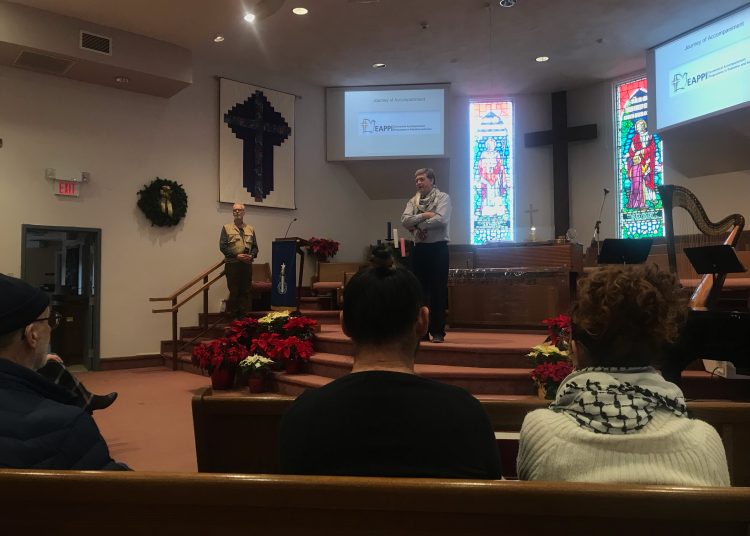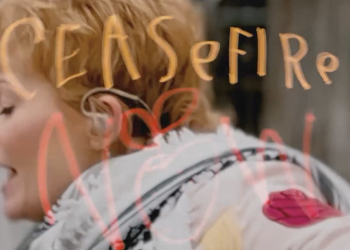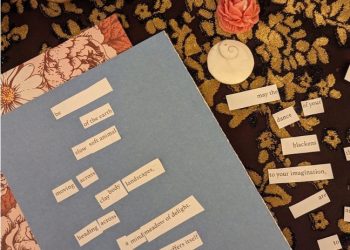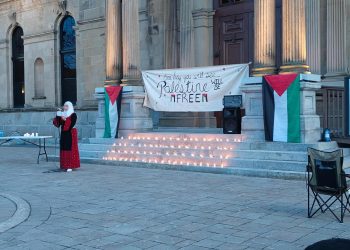At St. Paul’s United Church in Riverview, a crowd of perhaps two dozen sits scattered among the pews, listening intently to Reverend Steve Berube as he welcomes the attendees. They have come to listen to Bill Chambre, a retired Canadian military officer with 34 years of service, and a human rights observer with the Ecumenical Accompaniment Program in Palestine and Israel (EAPPI).
Chambre participated in two observation missions to Palestine with EAPPI, once to the South Hebron Hills in 2022, and another to East Jerusalem in 2023. Delivering his presentation in a clear, concise manner, and aided by a slide deck consisting of photographic evidence, maps and additional context, he provides an unflinching look at the reality of the Israeli occupation; a fact of life from which there is no escape for the Palestinian people.
As he describes his experiences in the occupied territories, one is immediately struck by the extremely strict controls that govern nearly every aspect of Palestinian life. No matter how much one learns about Israeli policies towards the occupied population, every new layer of detail evokes a chorus of feelings: disgust, pity, anger, compassion, sadness.
Chambre shares images of Palestinian homes slated for demolition by the state of Israel. When Palestinians homes are demolished to make way for new settlements, the Palestinians are often charged a fee for the “security” that is provided to Israeli demolition teams by the military. This fee can be waived by the Palestinian residents agreeing to destroy their own homes.
The stories of each demolition are profoundly cruel and cynical in their own way.
A family who had renovated the interior of their already existing structure into a beautiful modern kitchen, ordered to destroy the structure entirely. A family who built a new house beside their old one before being told their new house was illegal. They moved all of their belongings to the old house ahead of the scheduled demolition. The demolition team arrived and informed them that they would be destroying both of their houses. They were given five minutes to take any belongings they wanted out of the old house.
The level of control over Palestinian life in the occupied territories is overwhelming and difficult to fully comprehend without experiencing it firsthand. Militarized checkpoints control the flow of people into and out of many areas. In East Jerusalem, Israeli forces routinely stop Palestinian teenagers on their way to school, demanding their identification and subjecting them to physical search. These encounters can be violent, as Chambre shows pictures of in Israeli soldier with their hand on a Palestinian boys’ throat.
Chambre caught up with the boy following the incident, gathering details and a statement to file with UNICEF. He describes the reaction to being stopped. “[The boy] said what upset him the most was not so much being stopped, or even having a hand on his throat, but they fact that they hissed at him [when he asked them to return his ID]. That they treated him like he was an animal. They denied him his humanity.”
In his conclusion to the presentation, Chambre makes particular mention of how forcefully the Canadian government took a stand against the apartheid state of South Africa, even as British Prime Minister Margaret Thatcher and United States President Ronald Reagan would not do so. Showing a slide with polling data on Canadian attitudes toward Israel, he notes how a plurality of Canadians (prior to the events of October 7) viewed Israel as a state with apartheid, and only eleven percent of respondents viewed Israel as “a vibrant democracy.”
During the Q&A period, a recurring topic is the silence of large sections of Canadian society and the prevailing fear of being marked as antisemitic for expressing criticism of the state of Israel. As one attendee asks, “what advice do you have for someone who wants to spread awareness but also wants to keep their day job?”
Another attendee, originally from Egypt, expresses her surprise that there seems to be very little public discussion of what Canada is supporting in the occupied territories. “The normal communities that I know, at work, in the street, nobody speak[s] out about this occupation, what’s happening in Gaza. Is it ignorance, they don’t know, or they are on purpose, they [don’t] want to know?”
A third attendee points to Canada’s own historical status as a settler colonial project, which they feel is key to understanding the unwillingness of some Canadians to condemn Israel’s actions which are aimed at expanding the territory under its control and removing Palestinians.
A vital point in the conclusion of Bill’s presentation is the need for Parliament to establish clear definitions that allow open dialogue to take place. “Come up with a definition of antisemitism that doesn’t conflate criticism of Israel with actual antisemitism. […] Come up with a clear definition of apartheid. You’ve got two […] sets of laws applying to two different peoples in the same area. To me, that’s apartheid. And of course what’s going on now, depending on what definitions you use, is this genocide now? It certainly has the makings of a genocide. And we should not be on the wrong side of history on any genocide.”
When I speak with Jean-Claude Basque, organizer of Citizens for Peace which sponsored the event, he recognizes the limitations of the conversations being had within more established media spaces, and points to the fact that Canadians everywhere are engaging in more wide-ranging discussions, although in private. “People are talking… they are saying: we can’t continue like this.”
For Bill Chambre, his vision for a future Canadian policy with regards to Israel could perhaps be best summed up by his own words: “With South African apartheid, we were a leader. We were the first of the G7 countries to put sanctions on South Africa. Even at the Commonwealth meetings, Britain was against sanctions […] and African countries from the Commonwealth were turning to Canada. In those days we stood up against apartheid. And I would love to see us return to the days when human rights mattered for everyone.”
Ryan Hillier is a writer and settler living on the banks of the Petkootkweăk.










